


Game Five looked like it might have the weakest field of leaders in the opening round, a setup which also served to make the competition wide open for anyone to win. The seeded leaders here were the unimpressive pairing of Charlemagne and Shaka, neither one inspiring the fear and respect of characters like Justinian or Huayna Capac. Charlemagne was the extremely unlikely champion from Season Four whereas Shaka's incredible militarism had somehow managed to accumulate enough points to sneak into 16th place in the overall rankings. This was a chance for them to demonstrate that they deserved their unlikely rankings. Elsewhere, this game managed to draw a peaceful and religious duo in Asoka and Hatshepsut, and the two of them were also lucky enough to start next to one another. They would need to work together against the warmongering Napoleon (not to mention Shaka!) along with the perpetually underwhelming Bismarck. Was this finally the game where a German leader would serve as something more than roadkill for another more successful leader? There was little consensus from the community about which leader would emerge victorious, making this one of the most unpredictable AI Survivor games of the season.
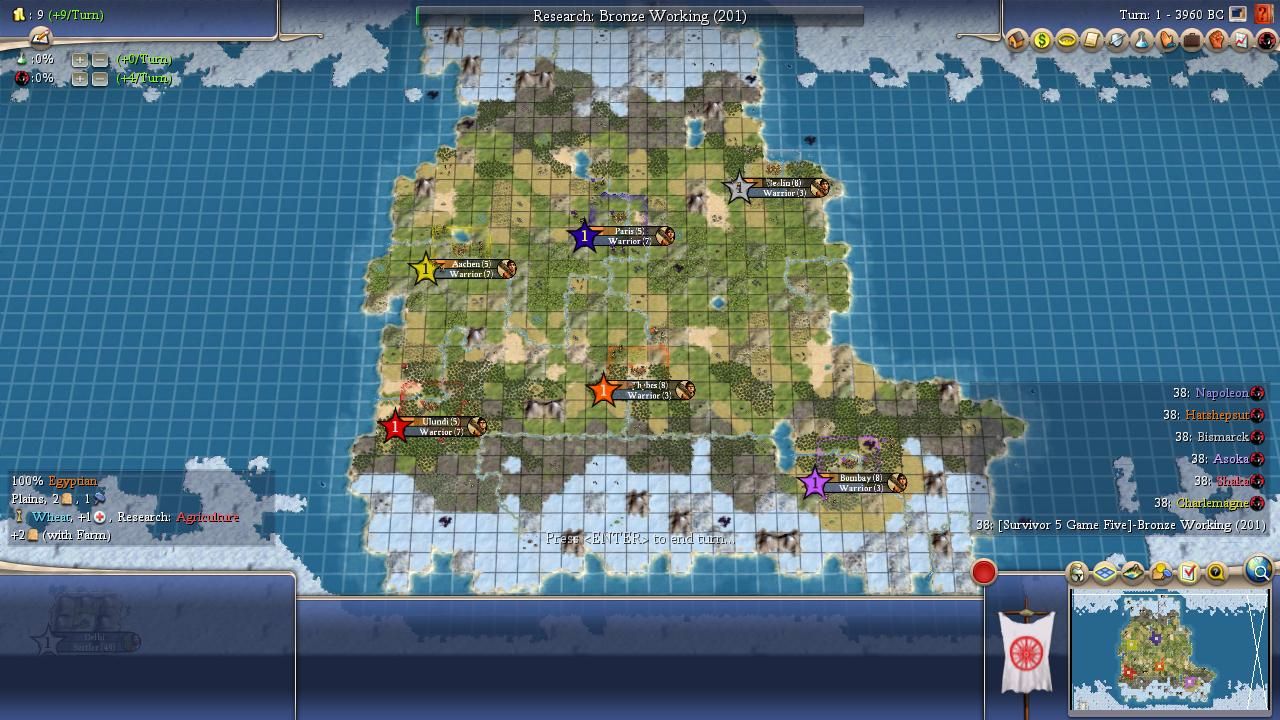
With such a small amount of non-tundra land available on this map, the initial city placements with the free starting settlers would be critical. Charlemagne, Napoleon, and Shaka all pushed directly towards the center of the map and situated their second cities within four tiles of one another. This ended up being highly significant because Charlemagne used his Mysticism starting tech to found Christianity in his new city, with the holy city culture dominating the shared border region. Both Napoleon and especially Shaka ended up getting squeezed as a result, not helped by the fact that they both did the warmonger thing and refused to research Mysticism tech for ages on end, leaving their early settlements stuck with the initial nine tile radius. Off to the east, Hatshepsut had sent her initial settler to the northeast and opened up a path to grab some additional land for Egypt. And Asoka took long enough walking his settler around that Buddhism appeared in his capital instead of in his second city. It's unclear if this helped him or hurt him but it was certainly something out of the ordinary.
It didn't take long for everyone to realize that Shaka was stuck on a limited amount of territory. Charlemagne's holy city was dominating the middle of the map culturally and Shaka would end up getting stuck on a mere five cities, two of them low-quality tundra locations that didn't even have food bonuses present without expanding borders. Napoleon was similarly forced to expand straight north into the tundra as Charlemagne claimed most of the high-quality land in between them. Hatshepsut was the unexpected score leader throughout the early game, pushing far out to the east and claiming a juicy gems region that by all right should have gone to Bismarck. The German leader had arrived there first only to have his city crushed by superior Egyptian culture, both the Creative trait and the Jewish holy city appearing next door. Asoka wasn't expanding particularly quickly but he did build Stonehenge and had a safe backlines area to grab later on. He just needed to make sure that he was the one to take the barbarian city that appeared in the far east.

This is typically where I'll post the overview map and then discuss the geopolitical situation as the landgrab phase came to and end. But there was one other thing that needed to be highlighted first in this game, an embarassingly bad performance from Bismarck:
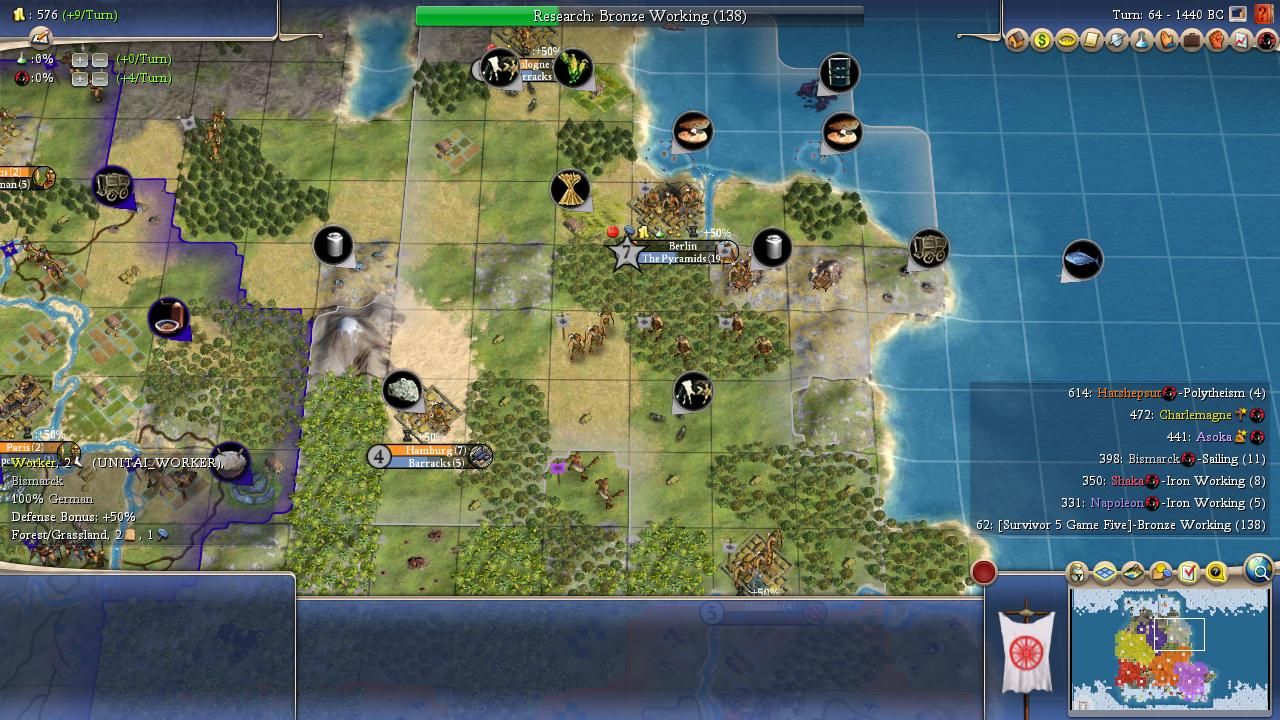
The German leader had a capital with quadruple food resources and he still managed to make a total mess of things. Bismarck ignored a bunch of critical techs that left his civilization a barbaric hinterland long after mighty empires were developing elsewhere. He failed to research Mysticism and therefore couldn't expand borders in any of his cities. He didn't research Animal Husbandry tech and left his multiple cattle resources unconnected for dozens of turns on end. Furthermore, he didn't even research The Wheel and thus couldn't even build roads!!! 
 The idiot decided to research Sailing tech instead and left all of his cities and non-seafood resources unconnected until approximately Turn 75. Germany was therefore a total sitting duck and it was a good thing that no one ended up attacking in the early game. Why did this happen - why was Bismarck so unexpectedly pathetic? As best we can tell, it was due to Bismarck's tech preferences where he has only one flavor: MILITARY. There are a few other leaders who have the same tech preference (Genghis Khan, Napoleon) and these leaders almost always seem to perform poorly. Ignoring absolutely everything with a cultural or economic bent to it doesn't work very well in Civ4.
The idiot decided to research Sailing tech instead and left all of his cities and non-seafood resources unconnected until approximately Turn 75. Germany was therefore a total sitting duck and it was a good thing that no one ended up attacking in the early game. Why did this happen - why was Bismarck so unexpectedly pathetic? As best we can tell, it was due to Bismarck's tech preferences where he has only one flavor: MILITARY. There are a few other leaders who have the same tech preference (Genghis Khan, Napoleon) and these leaders almost always seem to perform poorly. Ignoring absolutely everything with a cultural or economic bent to it doesn't work very well in Civ4.
Note that at the time of the above picture Hatshepsut was the overall score leader. While much of that was due to land points from early Creative culture, she was playing a genuinely strong opening to this game. The problem for Hatshepsut was the diplomatic picture, where she was the "worst enemy" of both Shaka and Napoleon. It was therefore no surprise when Shaka launched the first war of the game on Turn 61 with an invasion of Egypt. Hatty lacked copper but did have horses and therefore she was building a lot of war chariots that clashed with the Zulu units. Shaka's weak core of five cities was insufficient to punch through Creative culture and capture any cities while Hatshepsut couldn't train metal units and similarly had no chance of taking territory. It was a total stalemate that weakened both sides as units were traded pointlessly. The big question was whether Napoleon would join the war and lead to Egypt's downfall. Instead, he struck out at a different target:

France's decision to attack Holy Rome instead of Egypt was one of the biggest turning points of the game. If Napoleon and Shaka had worked together, they might have been able to bring down Hatshepsut and start snowballing off captured territory. But with each of them attacking different targets, the game instead turned into a series of parallel stalemates. Lots of units dying on each side to little effect. There was heavy fighting around the city of Augsburg where one Holy Roman archer made a heroic stand and promoted up to City Garrison III over a series of turns. It was one of the few times where the Protective trait actually came in useful. Charlemagne didn't have copper in his territory and this invasion took place while he was still researching Iron Working. Augsburg held out long enough for iron to be researched and connected, then fell to France, after which neither side could make any further progress. Napoleon eventually gave Augsburg back in the peace treaty ending the war - what a waste of time for everyone involved.
The big winner from all of this fighting was Asoka, who took advantage of his Egyptian meatshield to continue building wonders and settling the tundra in the south. Indian units were able to capture the barbarian city in their backlines and then set up a series of icy fishing villages that somehow managed to avoid the seafood resources with poor placement. By the time that Shaka and Hatshepsut signed peace on Turn 102, Asoka had established a clear lead in score over the rest of the field. His biggest weakness was a lack of expansion prospects out of the southeast corner, but that might not be an issue if the rest of the world continued beating away senselessly on each other. India was culturally dominant everywhere and exerting a lot of pressure on Hatshepsut's borders. That was the most likely explanation for the huge surprise that we saw next:

Hatshepsut invading Asoka, holy cow!  I certainly didn't see that one coming. Yet there was a decent rationale for the attack, with lots of "close borders" tension and the two leaders practicing rival faiths. This was another one of the turning points of the game and a strategic disaster for Hatshepsut, someone who needed to maintain friendly relations with India given the two low peace weight leaders to her north and west. After a dozen turns of indeterminate fighting, Napoleon piled onto the conflict and the race to partition Hatshepsut was on. All of the combatants had teched to Construction by this point in time and that meant cities would fall once the defenses were down. Asoka would end up capturing the Egyptian cities along his borders while Napoleon reached down from the north to carve out the heart of Hatshepsut's territory. The French were slowed in this conquest by Bismarck launching an invasion, an attack that largely caused Asoka to gain more of the remaining Egyptian territory. It was all over by Turn 156 with Hatshepsut becoming the first leader to exit the game:
I certainly didn't see that one coming. Yet there was a decent rationale for the attack, with lots of "close borders" tension and the two leaders practicing rival faiths. This was another one of the turning points of the game and a strategic disaster for Hatshepsut, someone who needed to maintain friendly relations with India given the two low peace weight leaders to her north and west. After a dozen turns of indeterminate fighting, Napoleon piled onto the conflict and the race to partition Hatshepsut was on. All of the combatants had teched to Construction by this point in time and that meant cities would fall once the defenses were down. Asoka would end up capturing the Egyptian cities along his borders while Napoleon reached down from the north to carve out the heart of Hatshepsut's territory. The French were slowed in this conquest by Bismarck launching an invasion, an attack that largely caused Asoka to gain more of the remaining Egyptian territory. It was all over by Turn 156 with Hatshepsut becoming the first leader to exit the game:

Most of the entrants in the picking contest had chosen Hatty as the First to Die, if not in the way that it ended up happening here. Most of us were expecting Shaka or Napoleon to be the ones administering the coup de grace, not Asoka. It was a disappointing finish for Hatshepsut given the strong opening that she had executed in this game. Still, it was hard to feel too sorry for her given the suicidal attack that she had launched against Asoka. If she had chosen to attack Shaka or Napoleon instead, Egypt may have been strong enough to take a top finish in this match.
Speaking of suicidal attacks, Shaka had earlier lost his mind and invaded Charlemagne on Turn 144. Holy Rome had almost double the score of the Zulus and completely dominated the border region between the two which made this an extremely one-sided affair. It was a classic case of Shaka being too aggressive for his own good, launching an attack without the corresponding technology and production base to back it up. Charlemagne wasn't fast but he was methodical, rolling up the Zulu cities one by one with his superior military forces. With Napoleon stuck in a pointless war with Bismarck and Asoka off doing his cultural thing in the southeast, there was no one available to come to Shaka's aid. By Turn 177 Shaka had been reduced to a pair of tundra cities and he was eliminated from the game entirely a dozen turns later:
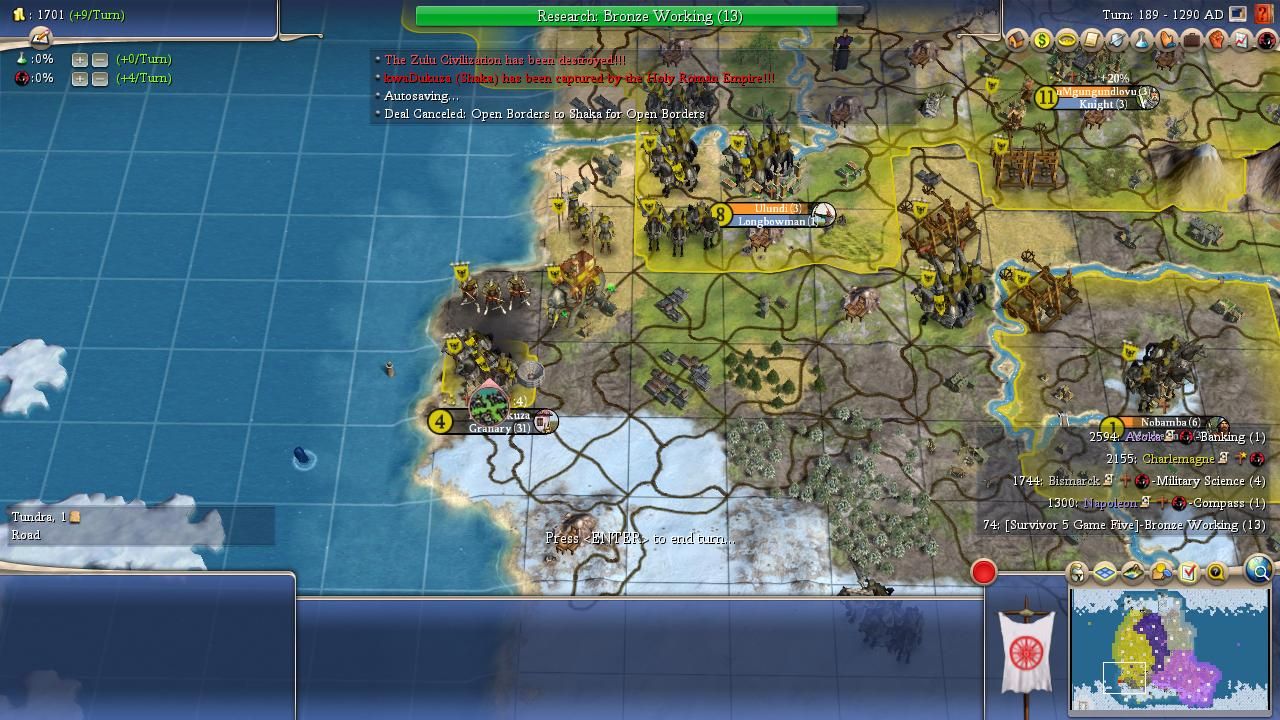
By feasting on Shaka's territory, Charlemagne emerged as the other dominant leader in this game alongside Asoka. Bismarck had never fully recovered from his stunted opening while Napoleon was hopelessly crushed in the center of the map, surrounded on all sides by high peace weight opponents who didn't care for his militarism. It didn't help either that Bismarck and Napoleon had fought a lengthy war that resulted in exactly one city changing hands. It seemed likely that it was only a matter of time until Napoleon kicked the bucket as well, and sure enough, the French leader decided to attack Bismarck on Turn 191. This amusingly took place at a time when most of the world's armies were deep in the southern tundra razing size 1 barbarian settlements, and it seemed as though Napoleon had the initial edge in the conflict. He captured a German border city and then continued onwards to put the core city of Cologne under siege. However, Napoleon's teching had been nothing less than awful throughout this game, something that's been a recurring pattern for him in AI Survivor over the years, and he was starting to fall dangerously behind in science. Bismarck soon reached Rifling tech for rifles and cavalry while Napoleon was half a dozen or more techs away. The tide of conflict soon turned and German units outfitted with Renaissance-era weapons began overrunning the medieval French forces. By Turn 250 the war was over and the Germans were celebrating Oktoberfest in Paris:

Let's give Bismarck a round of applause for earning his first-ever point in AI Survivor history by scoring a kill over another opponent. In theory, absorbing the French empire should have made Bismarck competitive with Asoka and Charlemagne thanks to gaining so much population and territory. However, the scoreboard in that screenshot revealed how far behind the game's co-leaders Bismarck still happened to be. Many of the French conquests turned out to be useless to Bismarck because they were surrounded by the stronger culture of Indian or Holy Roman core cities. Bismarck would ultimately see many of these cities either liberated away or culturally flipped to his rivals. I believe that Germany only ended up gaining three cities in total after the borders settled down and that wasn't enough to close the gap with Asoka and Charlemagne. Poor Bismarck: even when he succeeded, he was still failing.
Diplomatically the game now entered into a hibernetic state. Charlemagne and Asoka are both leaders that refuse to plot war at "Pleased" relations and therefore couldn't start a new conflict with anyone in the game. Only Bismarck had the chance to start a new war and he didn't seem eager to do so. It looked like we would have a tight race for the Spaceship or possibly might even experience a Diplomatic winning condition. Then Asoka decided to make his move by turning on the culture slider:
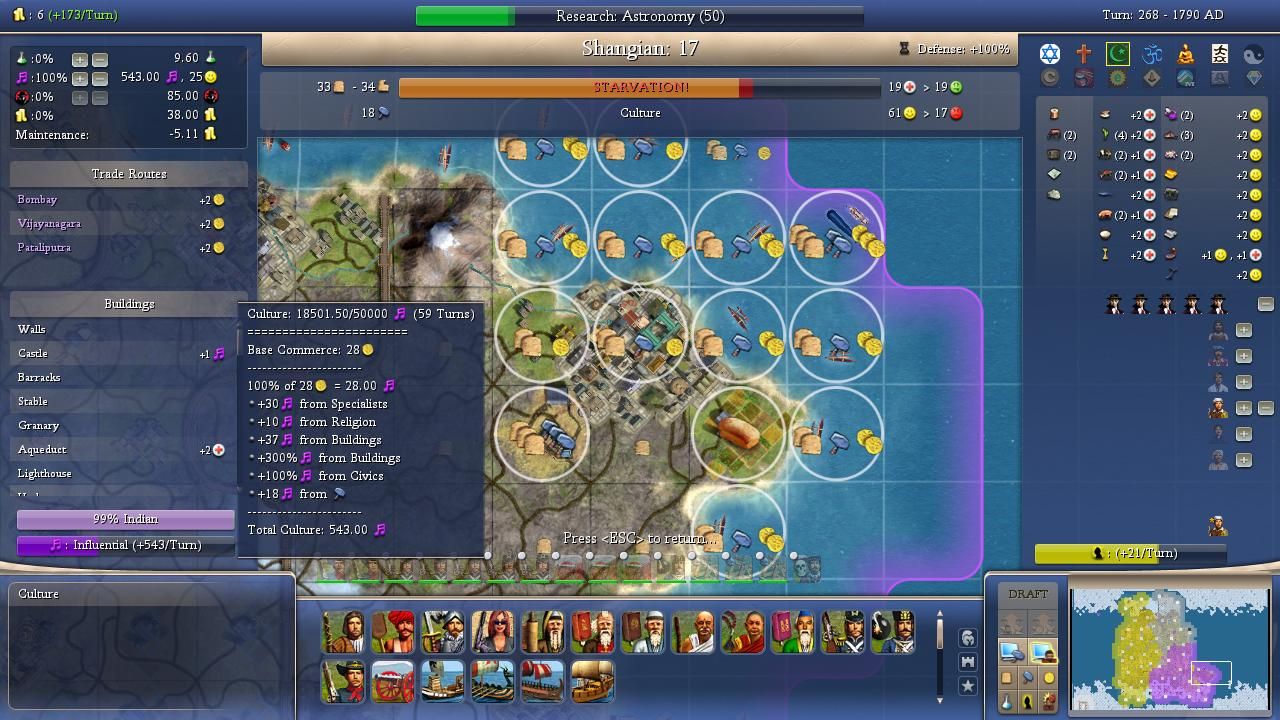
Asoka pulled the trigger right at the transition between the Renaissance and Industrial eras, while he had rifles/cavalry but before teching to Assembly Line for the next generation of military units. We could see right away that he was projecting to win sometime around Turn 325-330 if he held steady by running the culture slider. This would have been an earlier finish if Asoka had a good third spot for a legendary city; he had two strong locations but was forced to rely on this former barbarian city for his third. Even so, Asoka had founded four religions and built a ton of culture-producing wonders, including Sistine Chapel (the big wonder for AI cultural victories) so he was very much on track. Now it was a matter of sitting back and waiting to see if anyone would interrupt his cultural chase.
Asoka was helped here by having Free Religion as his favorite civic, which caused him to drop his unpopular Buddhism and maintain positive relations with everyone else. Charlemagne was "Pleased" with Asoka and would never declare war on his rival. It was therefore Bismarck or bust as far as seeing further action in this game, and it wasn't even clear if a German attack would have much success if it did come. Indian culture was ballooning outwards thanks to running the slider and the former French cities in German hands were being swallowed up. First the Indian capital went legendary on Turn 272, then the second city of Vijayanagara hit 50,000 culture on Turn 296. Was Bismarck ever going to do anything? He finally, belatedly, launched an invasion of Asoka on Turn 311 when the cultural victory was barely a dozen turns away from finishing:

But despite Asoka having spent the last 60 turns investing all of his commerce into culture and not science, Bismarck still didn't have a technology or military advantage. It remained a war of rifles and cavalry on each side, and with the border region completely dominated by Indian culture, that was a losing effort for Bismarck. His attack quickly turned into a miserable failure that didn't even produce a shark fin on the Power graphs, just some poor German soul falling off the edge of a cliff. Asoka used the opportunity presented by this war to snap up all of the cities along their shared border even as Shangian continued accumulating the last remaining missing culture. It went legendary on Turn 325 and Asoka was the winner
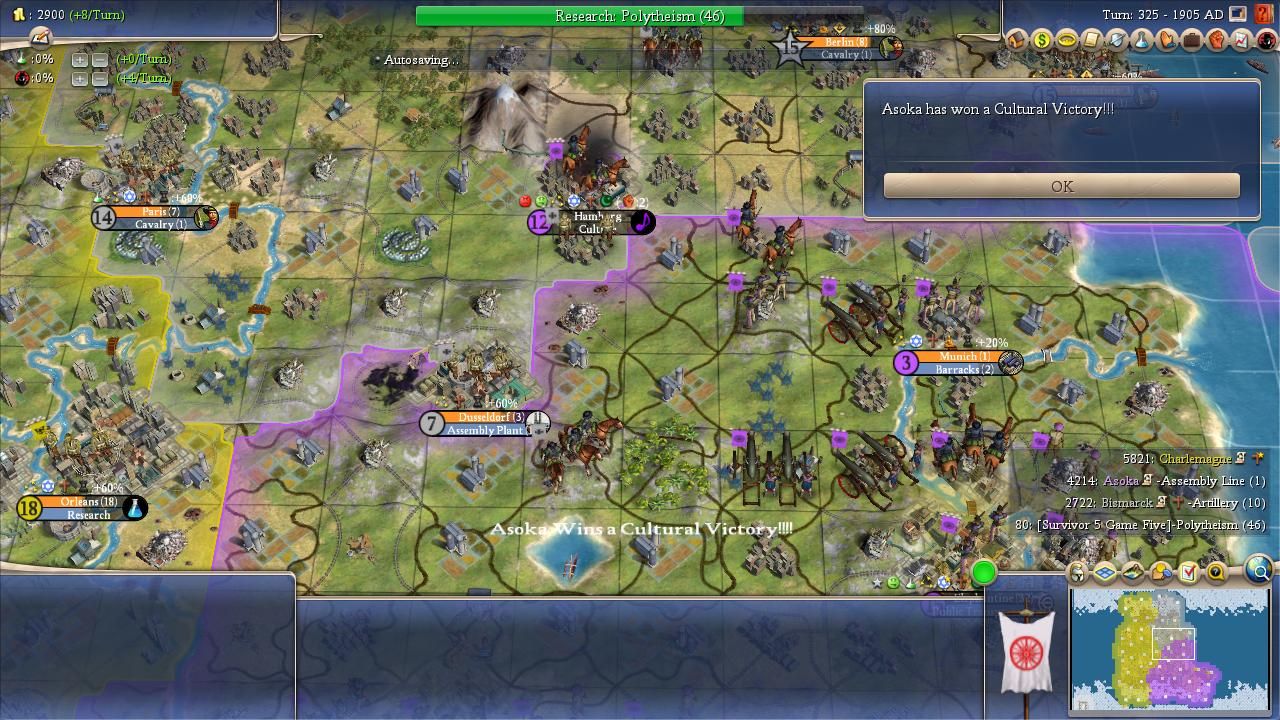
Charlemagne was considerably ahead in score and technology at the end of the game but still a good distance away from finishing the tech tree. It would have been interesting to see which leader would launch a spaceship first if they had both gone for space, Asoka having a slight lead at the end of the warring phase but less total land and population. While Charlemagne could have brushed aside Asoka with ease using his far superior military, he never even considered it thanks to being stuck at "Pleased" with everyone else. As we had seen with Gandhi earlier in Season Five, this ended up being a perfect setup for an Indian leader to chase after a peaceful win condition. Asoka never declared war even once the whole game and aside from taking three cities from Hatshepsut, largely sat in the corner doing his building thing for the whole game. That probably wouldn't have worked against a stronger field of leaders but it would good enough for the group drawn into this game.
We'll see Asoka and Charlemagne again in the playoffs while Bismarck will get another chance to do something in the Wildcard game. This could end up being an interesting game to revisit in alternate history scenarios due to the unpredictable nature of the leaders involved. If Napoleon had chosen to attack Hatshepsut instead of Charlemagne, or if Hatty hadn't engaged in ritual suicide with her attack on Asoka, this could have been a very different game. I also need to mention that I tied with Kjotleik as the winners of the picking contest for this game with 28 points, the best that I've ever done in a single game. It figures that I would get that result from a game where I had little confidence in my picks going into the match, heh. 



